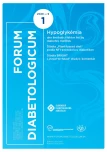Hypoglycemia in prisoners
Authors:
Jozef Lacka 1; Dominika Rubintová 2
Authors‘ workplace:
JAL, s. r. o., Trnava
1; PharmNova, s. r. o., Trnava
2
Published in:
Forum Diab 2020; 9(1): 38-42
Category:
Overview
The health care for prisoners – patients with type 2 as well as type 1 diabetes mellitus is provided by diabetologists based on regional location of prisons. The numbers of prisoners are rising, whereby also the numbers of patients in prisons increase. Most prisoners have primary education and secondary education without completing the final exams. Hypoglycemia may play a role during the time of making a decision to commit an offence. Hypoglycemia may occur too for different reasons during the first phase of being held in custody or while serving a sentence. Present-day technological possibilities allow for the improvement of management of patients with diabetes mellitus in prison. The ensuing challenge is to ascertain the number of prisoners with diabetes in Slovak prisons, and conduct a study into the management of these patients.
Keywords:
diabetes mellitus – hypoglycemia – prisoners
Sources
- Zbor väzenskej a justičnej stráže. Ročenka 2018. Dostupné z WWW: <https://www.zvjs.sk/sk/vyrocna-sprava>.
- Správa verejnej ochrankyne práv o dodržiavaní základných práv osôb umiestnených v ústavoch na výkon väzby a na výkon trestu odňatia slobody. Dostupné z WWW: <https://www.vop.gov.sk/sprava-o-dodrziavani-prav-vaznov>.
- Správa pre vládu Slovenskej republiky delegácie Európskeho výboru na zabráneniu mučenia a neľudskému či ponižujúcemu zaobchádzaniu alebo trestaniu v dňoch 18.-28.3. 2018. Dostupné z WWW: <https://rm.coe.int>.
- Frier B. Hypoglycemia in police custody and in prison. Diabetic hypoglycemia 2010; 2(3): 1–2.
- [American Diabetes Association]. Diabetes management in correctional institutions. Diabetes Care Diabetes Care 2010; 33(Suppl 1): S75–S81. Dostupné z DOI: <http://dx.doi.org/10.2337/dc10-S075>.
- Marks V. Forensic aspects of hypoglycemia. Diabetic Hypoglycemia 2010; 2(3): 3–8.
- Wright RJ, Barclay JIP, Plastow B et al. Management of diabetes in police custody: a liaison initiative between a diabetes specialist service and the police force. Pract Diab Int 2008; 25(2):72–75. Dostupné z DOI: <https://doi.org/10.1002/pdi.1209>.
- McCarren M. Enough is enough. What if you were arrested and not given access to your insulin? It happened in Philadelphia – again and again. But it won’t happen any more. Diabetes Forecast 2003; 56(9): 58–62.
- Gill GV, MacFarlane IA. Problems of diabetics in prison. Br Med J 1989; 298(6668): 221–223. Dostupné z DOI: <http://dx.doi.org/10.1136/bmj.298.6668.221>.
- MacFarlane IA, Gill GV, Masson E et al. Diabetes in prison: can good diabetic care be achieved? Br Med J 1992; 304 : 152–155. Dostupné z DOI: <http://dx-doi.org/10.1136/bmj.304.6820.152>.
- Petit JM, Guenfoudi MP, Volatier S et al. Management of diabetes in French prisons: a cross - sectional study. Diabet Med 2001; 18 : 47–50. Dostupné z DOI: <http://dx.doi.org/10.1046/j.1464–5491.2001.00407.x>.
- Marks V. Hypoglycaemia: insulin and conflicts with the law. Br J Diabetes Vasc Dis 2006; 6(6): 281–285. Dostupnè z DOI: <https://doi.org/10.1177/14746514060060060501>.
Labels
Diabetology Endocrinology Internal medicineArticle was published in
Forum Diabetologicum

2020 Issue 1
Most read in this issue
- Plant-based diet according to the NFI protocol in patients with type 2 diabetes mellitus: pilot study
- Hypoglycemia and sport
- Education of patients with hypoglycemia
- Insulin pump therapy and hypoglycemia
